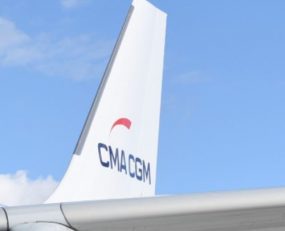
CMA CGM is emphasising growth, with announcements around its Q3 results highlighting acquisitions and investments in new ships, ports and also airfreight.
The headline is the expansion of CMA CGM’s aircraft fleet. The company had already announced the acquisition of more aircraft, however, there has been confirmation that CMA CGM has agreed to buy four new Airbus A350F for its CMA CGM Air Cargo subsidiary’s fleet. The company has also applied for a license to operate as a cargo airline, with plans to recruit directly employed pilots and with plans to establish a base at Paris-Charles de Gaulle airport.
In addition, CMA CGM has underlined its progress in expanding its presence in container terminal ownership, with deals in Spain, Lebanon, Abu Dhabi and the US over the past six months. It also has outlined the expansion of its shipping fleet which has increased by 5.9% over the past twelve months, with 10 new vessels and 49 new second-hand ships. It has grown its container fleet by 800,000 to 4.8m TEUs.
It has also begun to change the fuel that its ships use, building both ‘dual-fuel’ vessels capable of running on both LNG and fuel oil but also starting to construct a supply chain capable of producing synthetic methane to be used to power ships’ engines. CMA CGM says that it already has an “e-methane ready fleet” which “currently includes 20 vessels in service and will have a total of 44 by the end of 2024”.
All of this expansion happened within the context of buoyant financial results. The third quarter saw revenue rise 89.4% year-on-year whilst EBITDA exploded from US$1.7bn in Q3 2020 to US$7.1bn in Q3 2021. Net income was ten times higher year-on-year at US$5.628bn. All of this profit has been delivered on container volumes down 2.5% on the same period last year. As expected, CMA CGM commented that the container shipping market is “currently constrained by congestions affecting port terminals and inland infrastructures, leading to longer transit times for vessels.”
These sorts of numbers represent an extraordinary turnaround for a company that, just a few years ago, was struggling to survive. Although at present CMA CGM is still dominated by its container shipping business, it is clear intention is to create air, contract logistics and container terminal businesses that will create a broad and balanced logistics group. Making these other businesses profitable may not be easy, nonetheless, CMA CGM is quite a different company than that of five years ago.
Source: Transport Intelligence, 23 November 2021
Author: Thomas Cullen